Module 4 Seeing the doctor Unit 3 Language in use 教学课件
文档属性
| 名称 | Module 4 Seeing the doctor Unit 3 Language in use 教学课件 |
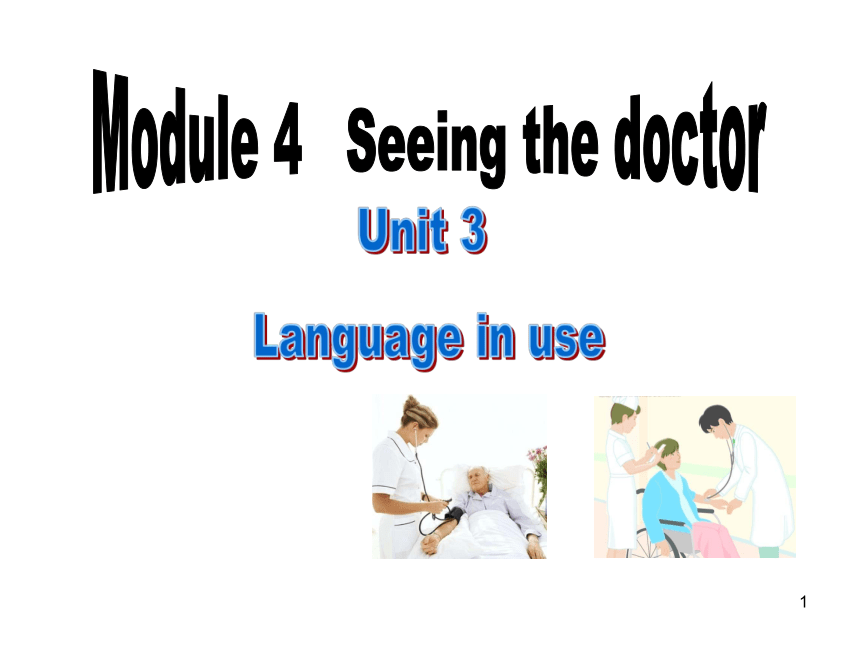
|
|
| 格式 | zip | ||
| 文件大小 | 1014.3KB | ||
| 资源类型 | 教案 | ||
| 版本资源 | 外研版 | ||
| 科目 | 英语 | ||
| 更新时间 | 2016-03-09 00:00:00 | ||
图片预览

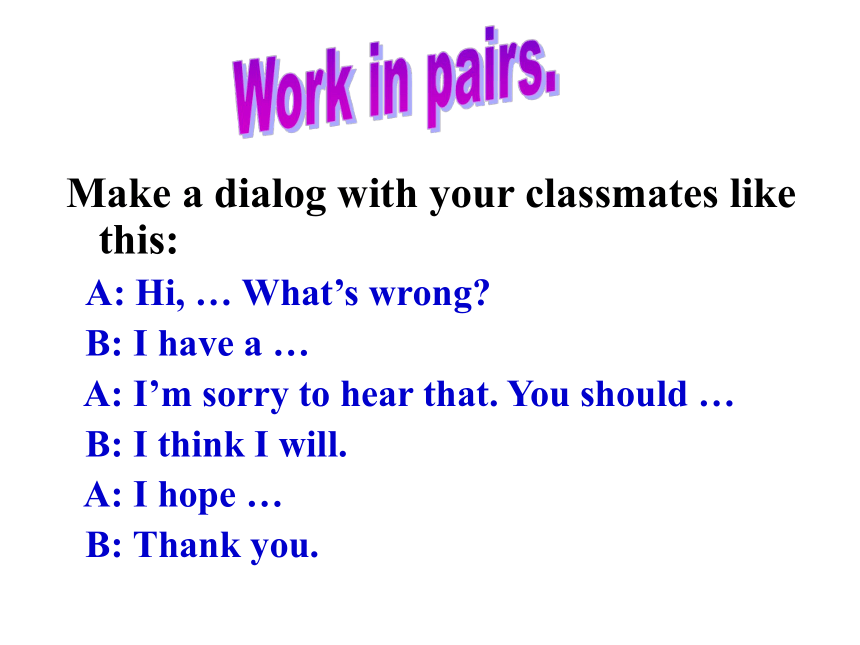
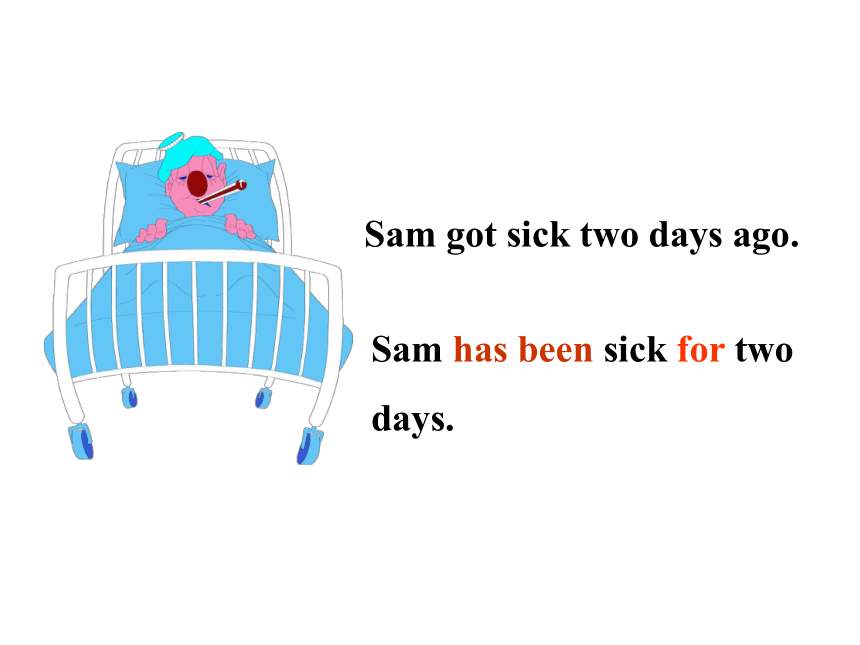
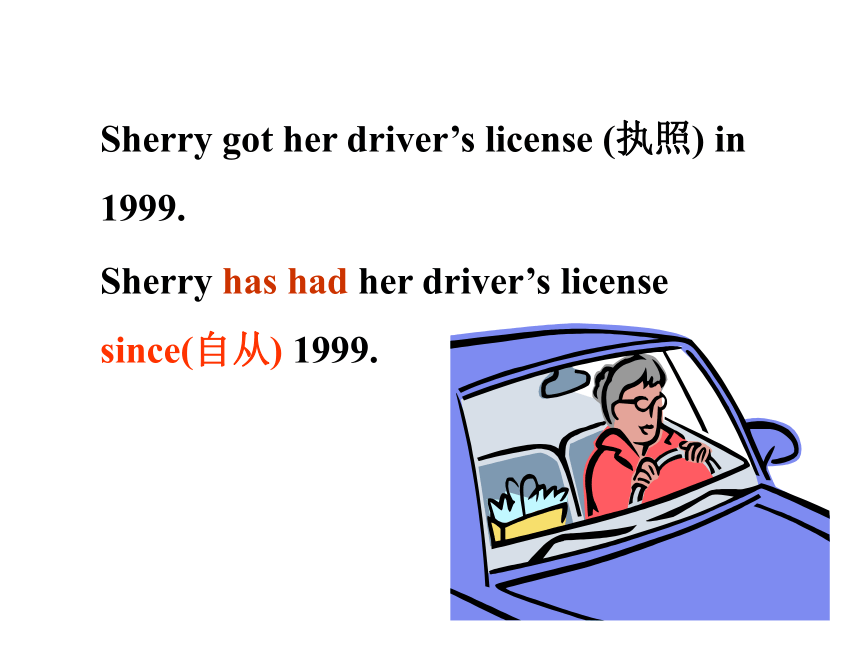
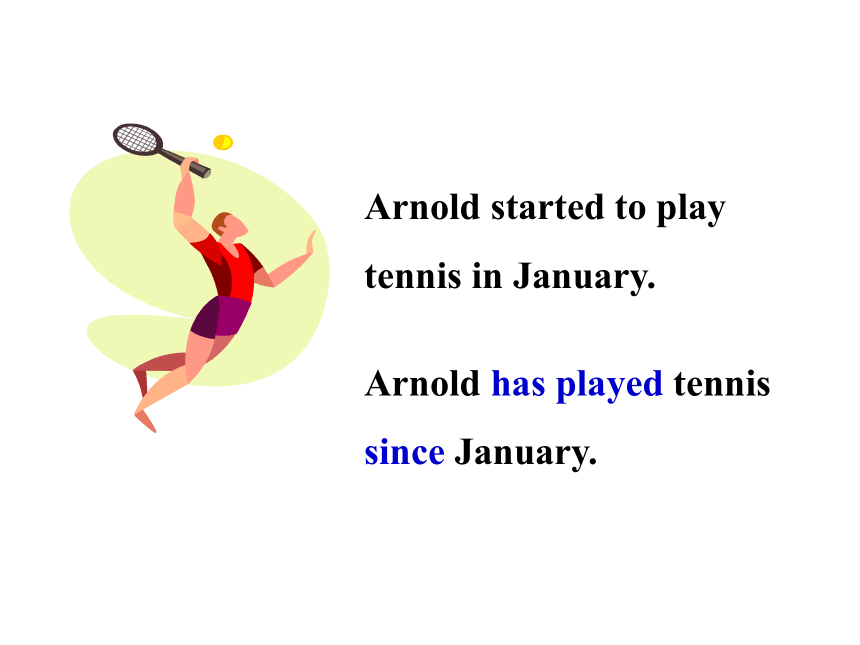


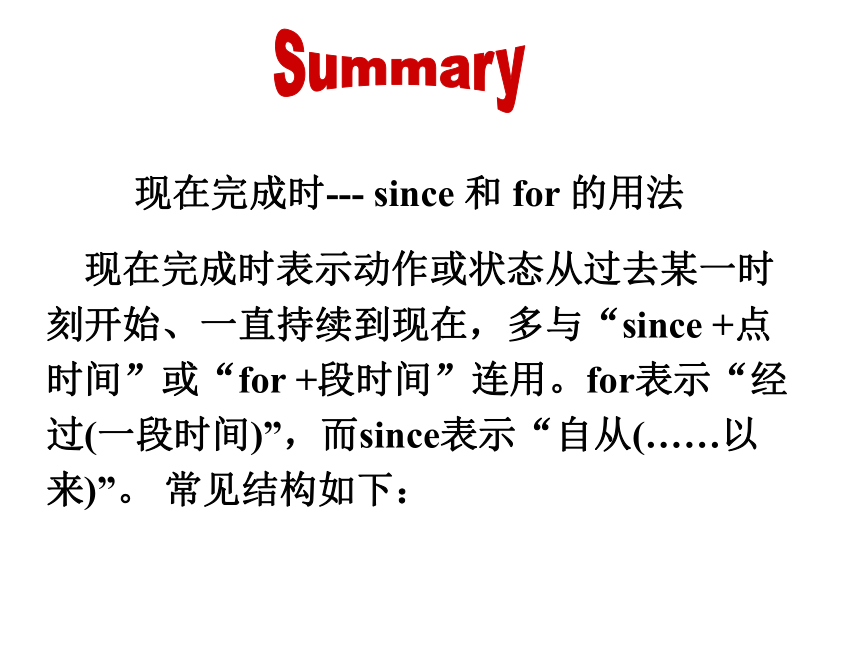
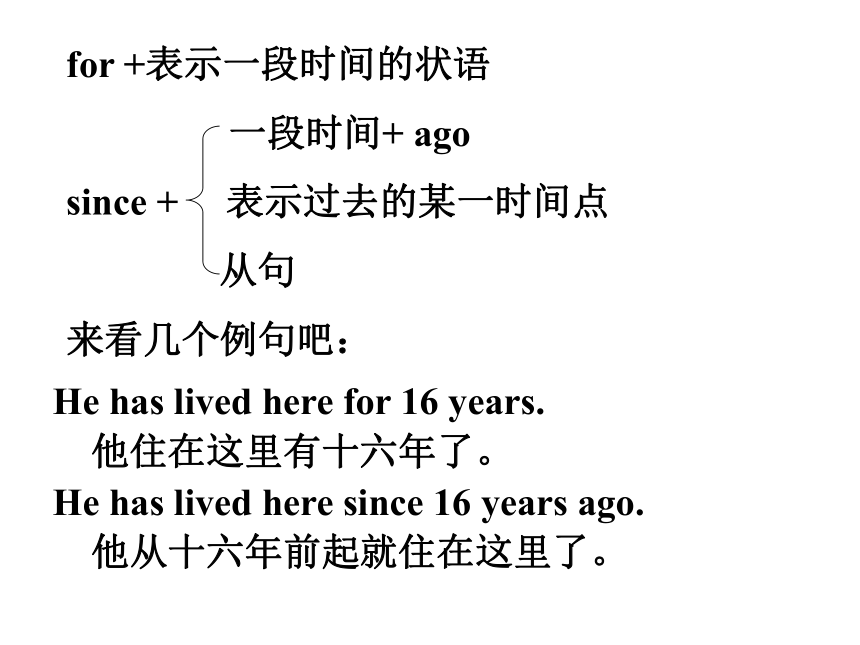
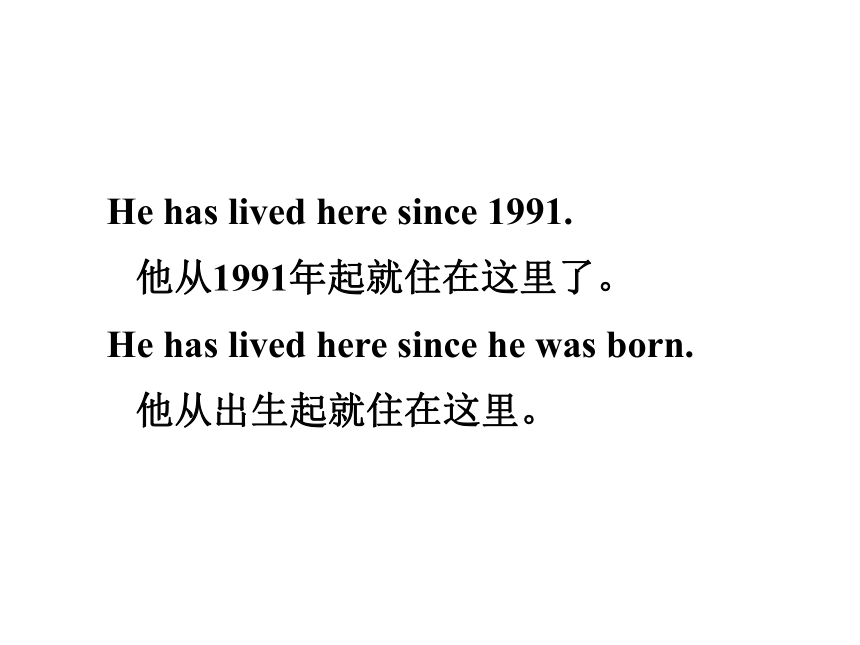
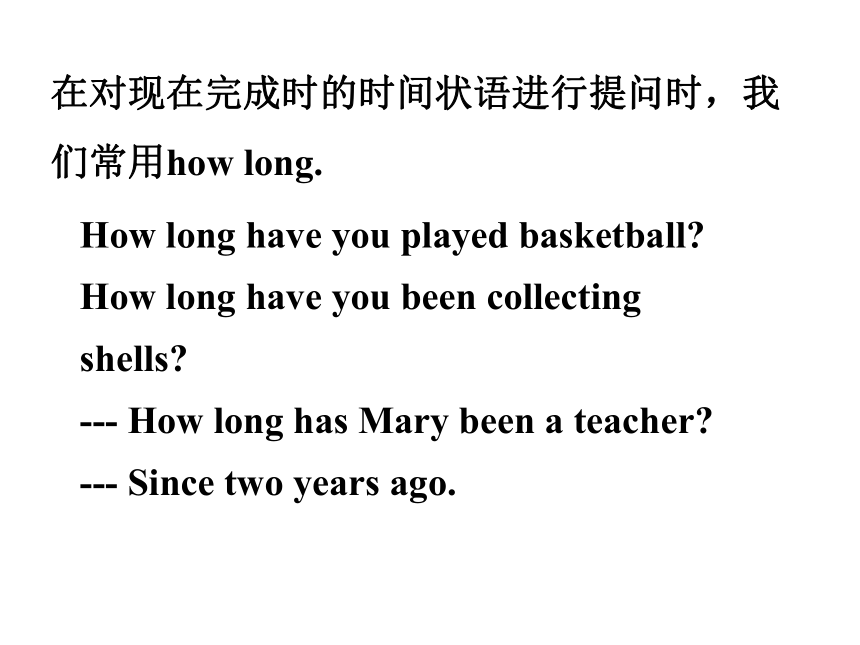
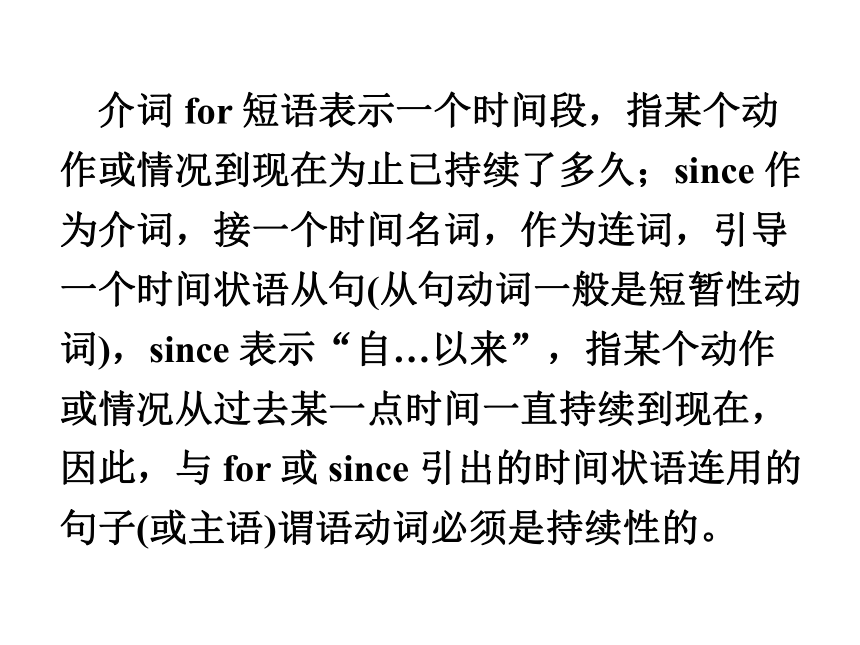
文档简介
课件38张PPT。1Module 4 Seeing the doctorUnit 3
Language in useMake a dialog with your classmates like this:
A: Hi, … What’s wrong?
B: I have a …
A: I’m sorry to hear that. You should …
B: I think I will.
A: I hope …
B: Thank you.Work in pairs.Sam got sick two days ago. Sam has been sick for two days. Sherry got her driver’s license (执照) in 1999. Sherry has had her driver’s license since(自从) 1999. Arnold started to play tennis in January. Arnold has played tennis since January. Maggie moved to Hawaii in 1996. Maggie has lived in Hawaii for about 18 years. 7Language practiceI haven’t done much exercise since I got my computer last year.
I have had him for three months now.
Since then, it has become part of my life. 现在完成时表示动作或状态从过去某一时刻开始、一直持续到现在,多与“since +点时间”或“for +段时间”连用。for表示“经过(一段时间)”,而since表示“自从(……以来)”。 常见结构如下:Summary现在完成时--- since 和 for 的用法He has lived here for 16 years.
他住在这里有十六年了。
He has lived here since 16 years ago.
他从十六年前起就住在这里了。He has lived here since 1991.
他从1991年起就住在这里了。
He has lived here since he was born.
他从出生起就住在这里。在对现在完成时的时间状语进行提问时,我们常用how long.How long have you played basketball?
How long have you been collecting shells?
--- How long has Mary been a teacher?
--- Since two years ago. 介词 for 短语表示一个时间段,指某个动作或情况到现在为止已持续了多久;since 作为介词,接一个时间名词,作为连词,引导一个时间状语从句(从句动词一般是短暂性动词),since 表示“自…以来”,指某个动作或情况从过去某一点时间一直持续到现在,因此,与 for 或 since 引出的时间状语连用的句子(或主语)谓语动词必须是持续性的。 英语中有些动词的意义不能持续,表示的是一瞬间就结束的动作,这些动词被称为非持续性动词或短暂性动词,常见的如 come, leave, go, lose, see, begin, start, arrive, become, die, buy, borrow, close, join, reach, fall, get up 等。这类动词可以用于完成时态,但在肯定句中不能与表示动作延续的时间状语 for 或 since 短语连用。如:
正: He has come back. 他已回来。
误: He has come back for three days. 若要表示“他回来已三天了”这样的意思,可以将动词改为延续性动词,或改变时间状语,或改用别的句型等,如译为:
He has been back for three days. (改变谓语动词)
He has been back since three days ago. (改变谓语动词)
He came back three days ago. (改变时间状语及动词 时态)
It’s three days since he came back. (改变句型) come, go, begin, start, become, join, end, die, buy, arrive, reach, borrow, lend, get to know等这些短暂性动词如果要谈论一个动作发生在过去某个时间点,我们可以使用ago或一般过去时。如:Kitty has left Beijing for two days.
Kitty left Beijing two days ago.
Kitty has been away from Beijing for two days.
Kitty has bought her purse since last year.
Kitty bought her purse a year ago.
Kitty has had her purse for a year.√√√√ 在表示持续一段时间的句子中,应将短暂性动词转化为相同意义的延续性动词或状态动词。
初中英语中常见的有: 短暂性动词延续性动词go, leave, move
arrive, come, reach
join,? become
buy, get(得到)be away (off),?? be out of
be here , be in +某地
be in,? be a (an) + n.
have短暂性动词延续性动词fall ill (asleep)
finish, end
begin , start
begin to learn (work, read, rain)
go out
get up
borrow
get to know
die
losebe ill (asleep)
be over
be on
learn, work , read,? rain
be out
be up
keep
know
be dead
be lost 非持续性动词用于完成时态,在肯定句中不能与for 或 since引出的短语(或句子)连用,但在否定句中是可以的,因为一个非延续性动词一旦被否定即成为状态,而状态总是可以延续的。如:
I haven’t seen him for a long time.
我很久没见到他了。
He hasn’t come here for some time.
他有段时间没来了。
I haven’t heard from her since she left.
自她离开以后,我一直没收到她的来信。 真题链接( ) 1. —Excuse me, where is Mr. Brown's office?
—Sorry, I don't know. I_____ here for only a few days.
A. work B. worked C. have worked D. will workC
( ) 2. My grandmother ______ a lot of changes in Tianjin since she came here. A.sees B. can see C. will see D. has seenD( ) 3. I many new friends since I came here.
A. make B. made
C. will make D. have madeD( ) 4. My aunt is a writer. She ____ more than ten books since 1980.
A. writes B. wrote
C. has written D. will writeC( ) 5. I ____ Mr. Smith since he moved to Shanghai.
A. didn’t hear from B. don’t hear from
C. won’t hear from D. haven’t heard fromD( ) 6. Not only Jam but also his parents ______ a few interesting places since they came to China.
A. will visit B. has visited
C. have visited D. visited C( ) 7. —Look at these stamps. I_____them for five years.
—Wow, they are wonderful.
A. kept B. have kept C. have boughtB( ) 8. He_____ for ten years.
A. has been married B. married
C. got married D. has marriedA( ) 9. My sister has learnt English_____.
A. for twelve years ago B. since she was four
C. twelve years ago D. at the age of fourB( ) 10. She ________ the book ________ two days ago.
A. has borrowed; since B. has kept; since
C. kept; forB选用 for和 since填空:
1.We haven’t seen each other ______ a long time.
2.His father has been in the Party ______ 10 years ago.
3.The film has been on ______ 20 minutes.forsincefor4. Mr Green has worked here ______ he came to China.
5. His grandparents have been dead ______ several years.
6. It’s five years _______ we met last time.sinceforsince271. —I feel ill two days ago.
—So you have _______ ill for two days?
—That’s right.
2. —I saw the doctor three days ago.
—So you haven’t _______ her in the last three days?
3. —I’ll walk to school for the first time tomorrow.
—So you’ve never __________ to school before?
4. —I came into hospital two days ago.
—So you have already _______ in hospital for two days?
5. —How long ________ you ___________ a headache?
—Oh, it began about two hours ago.3.Complete the sentences.beenseenwalkedbeen have had28For a long time John was not very (1)_______. He often had (2)____________ and colds. He went to see a doctor. The doctor told him to take more (3)_______ and stop eating (4)________. So he started riding a bike to school. At first, he felt tired and (5)________. Then he got fitter and started enjoying it. Since he started riding a bike, he has not had a(n)(6)________ and he has not had a(n)(7)____________ since he stopped eating fast food. 4.Complete the passage with the words and expression in the box.cold coughs exercise fast food
stomachache weak wellcoughswellexercisefast foodweakcoldstomachache295. Complete the conversation with the expressions in the box.Doctor: (1)_________________?
Bill: Well, (2)____________a pain in my back.
Doctor: (3) ______________________________?Can I help you How long have you been like this
I’ve got Let me That’s it What’s wrong withCan I help you I’ve got How long have you been like this 30Bill: For about two weeks.
Doctor: (4) ___________ have a look. Oh,
what do you do?
Bill: I work in an office.
Doctor: Do you play computer games?
Bill: Yes, a lot. I usually play computer
games late at night.
Let me
31Doctor (5)_____________.
Bill: (6)____________________me?
Doctor: Well, you spend too much time in front of the computer.
Bill:(7)_____________?
Doctor: Stand up and do some exercise from time to time. Don’t play computer games too much.That’s it What’s wrong withWhat can I do?32Read the passage and match the problems with the advice.1. I would like to take more exercise, but I have not found my favourite sport. The coach has not chosen me to play in the football team because I am not fit, and I am not a good player. I went running in the park to get fit, but I felt lonely and sad. What can I do? —Alan332. I went to school by bus in the past, and I did not feel fit. So last month I decided to take more exercise and started walking to school. I have walked to school for three weeks now. I am getting a lot fitter and I feel healthier. The problem is, all my friends take the bus to school and I do not have anyone to talk with on the way! What can I do? —Barbara343. I love playing computer games with my friends. I also watch TV and eat fast food. I know it is not healthy and sometimes I get a stomachache. The problem is, I do not know how to stop and become fitter and healthier. I do not want to spend all my life sitting in a chair. What can I do? —John35Have you tried this?2. —— a) 1. —— b) 3. —— c)a) Walking has helped you get fitter, so why not ask a friend to walk to school with you?
b) How about asking a friend to go running with you? Have you practised with the ball to improve your game?
c) Why not turn off the computer and TV and join a sports club? Go with your friends so that you will still spend time together. And how about choosing some healthy food to eat?36The World Health OrganizationThe World Health Organization (WHO) was set up in 1948 to help ordinary people all over the world, especially in developing countries. It cures, prevents and controls serious diseases such as malaria, and educates people about how to protect their health. The WHO has helped millions of people by training doctors and nurses, and by teaching mothers how to take better care of their children. 37Homework
Make a survey about others’ healthy problems and try to give them some advice .38Don’t put off till tomorrow what should be done today.
今日事,今日毕。
Language in useMake a dialog with your classmates like this:
A: Hi, … What’s wrong?
B: I have a …
A: I’m sorry to hear that. You should …
B: I think I will.
A: I hope …
B: Thank you.Work in pairs.Sam got sick two days ago. Sam has been sick for two days. Sherry got her driver’s license (执照) in 1999. Sherry has had her driver’s license since(自从) 1999. Arnold started to play tennis in January. Arnold has played tennis since January. Maggie moved to Hawaii in 1996. Maggie has lived in Hawaii for about 18 years. 7Language practiceI haven’t done much exercise since I got my computer last year.
I have had him for three months now.
Since then, it has become part of my life. 现在完成时表示动作或状态从过去某一时刻开始、一直持续到现在,多与“since +点时间”或“for +段时间”连用。for表示“经过(一段时间)”,而since表示“自从(……以来)”。 常见结构如下:Summary现在完成时--- since 和 for 的用法He has lived here for 16 years.
他住在这里有十六年了。
He has lived here since 16 years ago.
他从十六年前起就住在这里了。He has lived here since 1991.
他从1991年起就住在这里了。
He has lived here since he was born.
他从出生起就住在这里。在对现在完成时的时间状语进行提问时,我们常用how long.How long have you played basketball?
How long have you been collecting shells?
--- How long has Mary been a teacher?
--- Since two years ago. 介词 for 短语表示一个时间段,指某个动作或情况到现在为止已持续了多久;since 作为介词,接一个时间名词,作为连词,引导一个时间状语从句(从句动词一般是短暂性动词),since 表示“自…以来”,指某个动作或情况从过去某一点时间一直持续到现在,因此,与 for 或 since 引出的时间状语连用的句子(或主语)谓语动词必须是持续性的。 英语中有些动词的意义不能持续,表示的是一瞬间就结束的动作,这些动词被称为非持续性动词或短暂性动词,常见的如 come, leave, go, lose, see, begin, start, arrive, become, die, buy, borrow, close, join, reach, fall, get up 等。这类动词可以用于完成时态,但在肯定句中不能与表示动作延续的时间状语 for 或 since 短语连用。如:
正: He has come back. 他已回来。
误: He has come back for three days. 若要表示“他回来已三天了”这样的意思,可以将动词改为延续性动词,或改变时间状语,或改用别的句型等,如译为:
He has been back for three days. (改变谓语动词)
He has been back since three days ago. (改变谓语动词)
He came back three days ago. (改变时间状语及动词 时态)
It’s three days since he came back. (改变句型) come, go, begin, start, become, join, end, die, buy, arrive, reach, borrow, lend, get to know等这些短暂性动词如果要谈论一个动作发生在过去某个时间点,我们可以使用ago或一般过去时。如:Kitty has left Beijing for two days.
Kitty left Beijing two days ago.
Kitty has been away from Beijing for two days.
Kitty has bought her purse since last year.
Kitty bought her purse a year ago.
Kitty has had her purse for a year.√√√√ 在表示持续一段时间的句子中,应将短暂性动词转化为相同意义的延续性动词或状态动词。
初中英语中常见的有: 短暂性动词延续性动词go, leave, move
arrive, come, reach
join,? become
buy, get(得到)be away (off),?? be out of
be here , be in +某地
be in,? be a (an) + n.
have短暂性动词延续性动词fall ill (asleep)
finish, end
begin , start
begin to learn (work, read, rain)
go out
get up
borrow
get to know
die
losebe ill (asleep)
be over
be on
learn, work , read,? rain
be out
be up
keep
know
be dead
be lost 非持续性动词用于完成时态,在肯定句中不能与for 或 since引出的短语(或句子)连用,但在否定句中是可以的,因为一个非延续性动词一旦被否定即成为状态,而状态总是可以延续的。如:
I haven’t seen him for a long time.
我很久没见到他了。
He hasn’t come here for some time.
他有段时间没来了。
I haven’t heard from her since she left.
自她离开以后,我一直没收到她的来信。 真题链接( ) 1. —Excuse me, where is Mr. Brown's office?
—Sorry, I don't know. I_____ here for only a few days.
A. work B. worked C. have worked D. will workC
( ) 2. My grandmother ______ a lot of changes in Tianjin since she came here. A.sees B. can see C. will see D. has seenD( ) 3. I many new friends since I came here.
A. make B. made
C. will make D. have madeD( ) 4. My aunt is a writer. She ____ more than ten books since 1980.
A. writes B. wrote
C. has written D. will writeC( ) 5. I ____ Mr. Smith since he moved to Shanghai.
A. didn’t hear from B. don’t hear from
C. won’t hear from D. haven’t heard fromD( ) 6. Not only Jam but also his parents ______ a few interesting places since they came to China.
A. will visit B. has visited
C. have visited D. visited C( ) 7. —Look at these stamps. I_____them for five years.
—Wow, they are wonderful.
A. kept B. have kept C. have boughtB( ) 8. He_____ for ten years.
A. has been married B. married
C. got married D. has marriedA( ) 9. My sister has learnt English_____.
A. for twelve years ago B. since she was four
C. twelve years ago D. at the age of fourB( ) 10. She ________ the book ________ two days ago.
A. has borrowed; since B. has kept; since
C. kept; forB选用 for和 since填空:
1.We haven’t seen each other ______ a long time.
2.His father has been in the Party ______ 10 years ago.
3.The film has been on ______ 20 minutes.forsincefor4. Mr Green has worked here ______ he came to China.
5. His grandparents have been dead ______ several years.
6. It’s five years _______ we met last time.sinceforsince271. —I feel ill two days ago.
—So you have _______ ill for two days?
—That’s right.
2. —I saw the doctor three days ago.
—So you haven’t _______ her in the last three days?
3. —I’ll walk to school for the first time tomorrow.
—So you’ve never __________ to school before?
4. —I came into hospital two days ago.
—So you have already _______ in hospital for two days?
5. —How long ________ you ___________ a headache?
—Oh, it began about two hours ago.3.Complete the sentences.beenseenwalkedbeen have had28For a long time John was not very (1)_______. He often had (2)____________ and colds. He went to see a doctor. The doctor told him to take more (3)_______ and stop eating (4)________. So he started riding a bike to school. At first, he felt tired and (5)________. Then he got fitter and started enjoying it. Since he started riding a bike, he has not had a(n)(6)________ and he has not had a(n)(7)____________ since he stopped eating fast food. 4.Complete the passage with the words and expression in the box.cold coughs exercise fast food
stomachache weak wellcoughswellexercisefast foodweakcoldstomachache295. Complete the conversation with the expressions in the box.Doctor: (1)_________________?
Bill: Well, (2)____________a pain in my back.
Doctor: (3) ______________________________?Can I help you How long have you been like this
I’ve got Let me That’s it What’s wrong withCan I help you I’ve got How long have you been like this 30Bill: For about two weeks.
Doctor: (4) ___________ have a look. Oh,
what do you do?
Bill: I work in an office.
Doctor: Do you play computer games?
Bill: Yes, a lot. I usually play computer
games late at night.
Let me
31Doctor (5)_____________.
Bill: (6)____________________me?
Doctor: Well, you spend too much time in front of the computer.
Bill:(7)_____________?
Doctor: Stand up and do some exercise from time to time. Don’t play computer games too much.That’s it What’s wrong withWhat can I do?32Read the passage and match the problems with the advice.1. I would like to take more exercise, but I have not found my favourite sport. The coach has not chosen me to play in the football team because I am not fit, and I am not a good player. I went running in the park to get fit, but I felt lonely and sad. What can I do? —Alan332. I went to school by bus in the past, and I did not feel fit. So last month I decided to take more exercise and started walking to school. I have walked to school for three weeks now. I am getting a lot fitter and I feel healthier. The problem is, all my friends take the bus to school and I do not have anyone to talk with on the way! What can I do? —Barbara343. I love playing computer games with my friends. I also watch TV and eat fast food. I know it is not healthy and sometimes I get a stomachache. The problem is, I do not know how to stop and become fitter and healthier. I do not want to spend all my life sitting in a chair. What can I do? —John35Have you tried this?2. —— a) 1. —— b) 3. —— c)a) Walking has helped you get fitter, so why not ask a friend to walk to school with you?
b) How about asking a friend to go running with you? Have you practised with the ball to improve your game?
c) Why not turn off the computer and TV and join a sports club? Go with your friends so that you will still spend time together. And how about choosing some healthy food to eat?36The World Health OrganizationThe World Health Organization (WHO) was set up in 1948 to help ordinary people all over the world, especially in developing countries. It cures, prevents and controls serious diseases such as malaria, and educates people about how to protect their health. The WHO has helped millions of people by training doctors and nurses, and by teaching mothers how to take better care of their children. 37Homework
Make a survey about others’ healthy problems and try to give them some advice .38Don’t put off till tomorrow what should be done today.
今日事,今日毕。
同课章节目录
- Module 1 Feelings and impressions
- Unit 1 It smells delicious.
- Unit 2 I feel nervous when I speak Chinese .
- Unit 3 Language in use
- Module 2 Experiences
- Unit 1 I've also entered lots of speaking competi
- Unit 2 They have seen the Pyramids.
- Unit 3 Language in use
- Module 3 Journey to space
- Unit 1 Has it arrived yet?
- Unit 2 We have not found life on any other planet
- Unit 3 Language in use
- Module 4 Seeing the docto
- Unit 1 I haven't done much exercise since I got m
- Unit 2 We have played football for a year now
- Unit 3 Language in use
- Module 5 Cartoons
- Unit 1 It's time to watch a cartoon.
- Unit 2 Tintin has been popular for over eighty yea
- Unit 3 Language in use
- Revision module A
- Module 6 Hobbies
- Unit 1 Do you collect anything ?
- Unit 2 Hobbies can make you grow as a person.
- Unit 3 Language in use
- Module 7 Summer in Los Angeles
- Unit 1 Please write to me and send me some photos
- Unit 2 Fill out a form and come to learn English
- Unit 3 Language in use
- Module 8 Time off
- Unit 1 I can hardly believe we are in the city ce
- Unit 2 We thought somebody was moving about
- Unit 3 Language in use
- Module 9 Friendship
- Unit 1 Could I ask if you've mentioned this to he
- Unit 2 I believe that the world is what you think
- Unit 3 Language in use
- Module 10 On the radio
- Unit 1 I hope that you can join us one day
- Unit 2 It seemed that they were speaking to me in
- Unit 3 Language in use
- Revision module B
